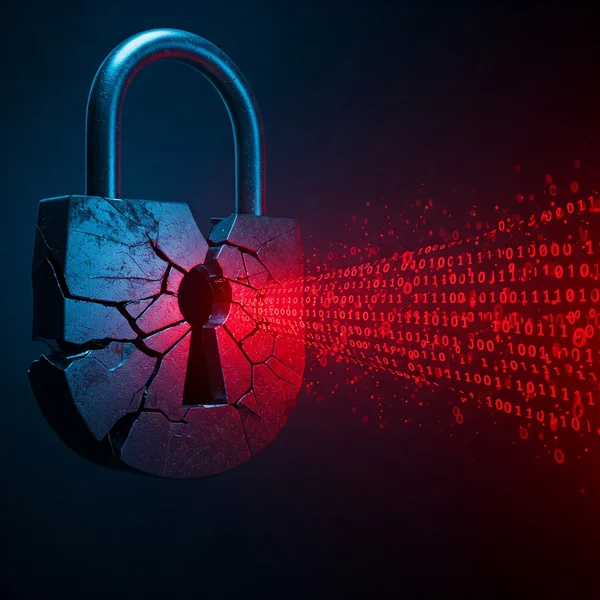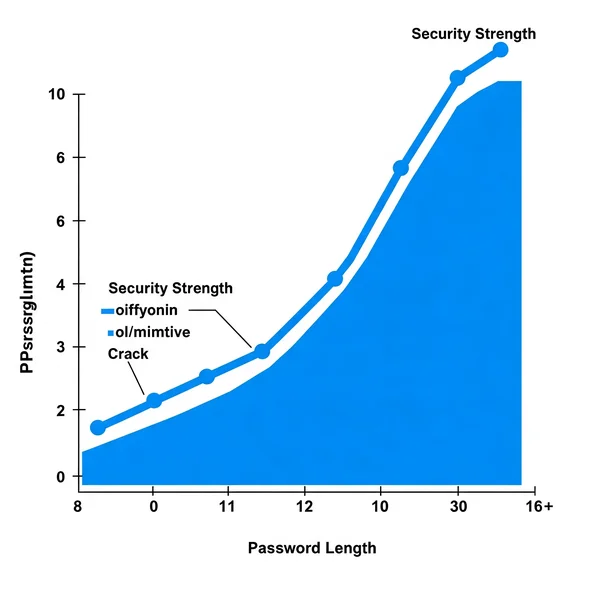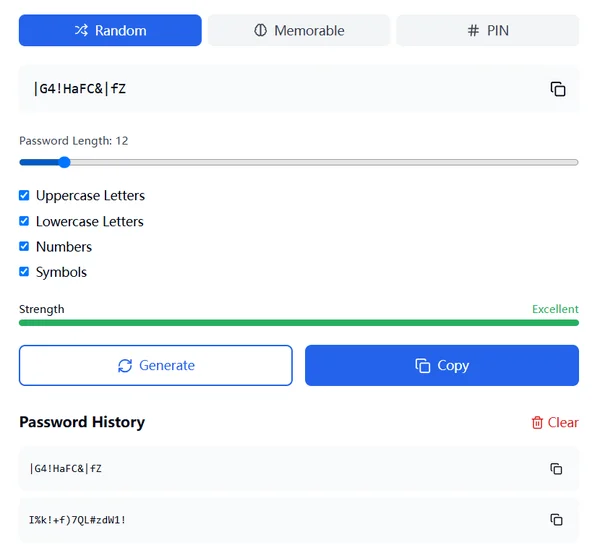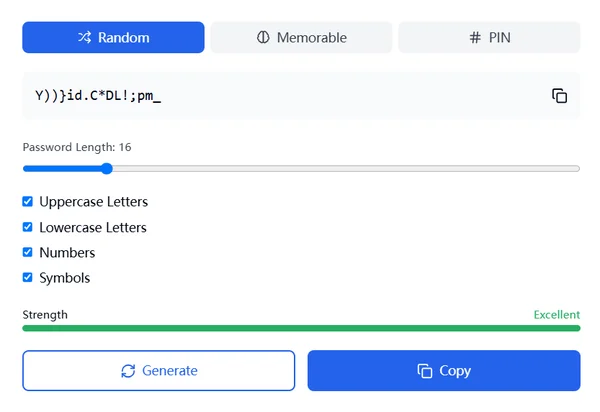Create a Truly Strong Password: Length, Complexity & More
We covered why using a password generator is crucial in our previous discussion. But simply generating any password isn't enough. You need to know how to create a strong password – one that stands up against modern cyber threats. Moving beyond easily guessed phrases like 'Password123' requires understanding the key ingredients: password length, password complexity, and true randomness. Is your current method truly secure? This guide dives deep into the essential elements recommended by security experts to help you forge truly unbreakable digital keys. Ready to master password security? Let's begin exploring password security best practices.
The Real Impact of Password Weakness
Before we dissect the 'how', let's quickly revisit the 'why'. Weak passwords are the low-hanging fruit for cybercriminals. They use automated tools to exploit common vulnerabilities, leading to account takeovers, identity theft, and financial loss. Understanding the specific ways attackers operate highlights why focusing on strength is non-negotiable for your account security.
Understanding Brute-Force and Dictionary Attacks
Brute-force attacks involve software trying every possible character combination until it guesses correctly. The longer and more complex your password, the astronomically longer this takes. Dictionary attacks use lists of common words, phrases, and previously leaked passwords. A strong password avoids dictionary words and predictable patterns entirely, rendering these attacks ineffective. Creating a password immune to these is key.

The Snowball Effect of a Single Compromised Password
If you reuse passwords (a major mistake!), a single breach on one website can compromise all accounts using that same credential. This is 'credential stuffing'. Ensuring every password is not only strong but also unique is paramount.
How Long Should Your Password Be?
One of the most frequently asked questions is: how long should your password be? While older advice might have suggested 8 characters, modern security standards demand more. Password length is arguably the single most critical factor in resisting brute-force attacks.
Recommended minimum password settings
Is 8 characters enough? In today's landscape, generally no. While significantly better than 6, an 8-character password using only letters and numbers can often be cracked relatively quickly with modern hardware. Security experts strongly advise moving past this minimum.
NIST Guidelines on Password Length
The National Institute of Standards and Technology (NIST) provides influential NIST password guidelines. While they've moved away from mandating specific complexity requirements like forced character types, they strongly emphasize length. Their recommendations support using longer passphrases or generated passwords, often suggesting a minimum of 12-15 characters or more, especially if complexity is lower.
How Each Added Character Increases Security Exponentially
Think of it mathematically. Each character you add multiplies the total number of possible combinations. Adding just one character to a password using uppercase, lowercase, numbers, and symbols increases the cracking time exponentially. This is why length provides such a powerful defense.

Finding the Sweet Spot: 12, 16, or More?
Aim for at least 12 characters as a solid baseline for most online accounts. For critical accounts (email, banking, password managers), 16 characters or even longer provides significantly more robust protection. Using a strong password generator makes achieving these lengths effortless.
Decoding Password Complexity
Length is vital, but password complexity – the variety of characters used – adds another critical layer of security. What makes a password complex? It's the inclusion of different character sets.
The Four Essential Character Types Explained
A truly complex password should ideally draw from all four main character types:
-
Uppercase Letters: (A-Z)
-
Lowercase Letters: (a-z)
-
Numbers: (0-9)
-
Special Characters (Symbols): (!@#$%^&*()_+-=[]{}|;:',./<>?`~)

Why Just Letters and Numbers Isn't Enough
Using only letters and numbers significantly limits the pool of possible characters, making brute-force attacks easier. Each character type you add dramatically increases the size of this pool, making the password exponentially harder to guess.
Leveraging Special Characters for Maximum Complexity
Special characters are particularly effective because they expand the character set considerably. Including even one or two symbols drastically increases the permutations attackers must try, significantly bolstering your password's strength against brute-force attempts. A secure password generator will incorporate these effectively.
Why Predictability is Your Security's Enemy
You can have a long, complex password that's still weak if it's predictable. Think "P@sswOrd123!". True strength comes from randomness. Why is this crucial for password security?
Defining True Randomness vs. Human Patterns
Humans are terrible at creating randomness. We use dictionary words, names, dates, keyboard patterns (like 'qwertyuiop'), or simple substitutions ('@' for 'a'). True randomness means each character is chosen independently, without any discernible pattern or connection to personal information or common words.
How Predictable Sequences Undermine Strength
Attackers' tools are programmed to check for these common patterns and substitutions first. If your password follows a predictable sequence, even if long and complex-looking, it might be cracked quickly.
The Role of Entropy in Password Security
In password terms, entropy measures unpredictability or randomness. Higher entropy means a stronger password because there are more possibilities an attacker must check. Length, complexity (using all character types), and true randomness all contribute to higher entropy. This is where using a secure password generator shines, as it's designed to maximize entropy.
Other Factors in Strong Password Creation
While length, complexity, and randomness are the technical pillars, other practices are essential when you create strong password habits. What else should you consider?
The Golden Rule: Uniqueness for Every Account
Never, ever reuse passwords across different websites or services. Every single account needs its own unique password. This contains the damage if one account is ever compromised. This is perhaps the most critical password security rule.
Avoiding Personal Information Like the Plague
Do not use names (yours, family, pets), birthdays, anniversaries, addresses, phone numbers, or any other publicly available or easily guessable personal information in your passwords.
Steering Clear of Common Words and Phrases
Avoid dictionary words, common phrases, song lyrics, movie quotes, or anything easily found in wordlists used for dictionary attacks. Even slightly modified common words are often easily cracked.
Using a Strong Password Generator Effectively
Manually creating passwords that meet all these criteria (long, complex, random, unique) is challenging and impractical for dozens of accounts. This is precisely why a strong password generator is an indispensable tool. How does it help you create strong passwords?
How Generators Ensure Optimal Length and Complexity
A good strong password generator allows you to specify the desired length and ensure the inclusion of all four character types (uppercase, lowercase, numbers, symbols), instantly meeting the core requirements for strength.

Utilizing Generator Options for Custom Needs
Most generators offer options. You can adjust the length (e.g., create a 12 character password or longer), include/exclude specific character types if a site has odd requirements, and generate multiple options quickly.
Generate Your Strong Password Here
Applying these principles is easy with the right tool. You can instantly generate strong password options tailored to your needs, ensuring maximum security without the guesswork.
Your Action Plan for Crafting Fort Knox Passwords
Creating truly strong passwords isn't black magic; it's about understanding and applying core security principles. Remember the pillars:
- Length: Aim for 12-16+ characters.
- Complexity: Use a mix of uppercase, lowercase, numbers, and symbols.
- Randomness: Avoid predictable patterns; let a generator handle this.
- Uniqueness: Never reuse passwords.
By focusing on these elements, you drastically reduce your vulnerability to common attacks. While manually crafting such passwords is hard, using a reliable password generator service makes implementing these best practices simple and effective. Take charge of your account security today!
What aspect of creating strong passwords do you find most challenging? Share your thoughts or questions in the comments below!
Strong Password FAQs
Q1: What is an example of a strong 12-character password?
A: A good example generated randomly might look like Tr!8#kPz$vN9. What makes this an example of a strong password? It's 12 characters long, uses uppercase letters, lowercase letters, numbers, and special characters, and appears completely random (no dictionary words or obvious patterns). You can easily generate similar examples.
Q2: Is a random mix of letters really better than a memorable phrase?
A: From a pure security standpoint against automated attacks, a truly random string generated by a strong password generator is generally stronger than a passphrase of the same length. However, very long passphrases (e.g., 4+ random words) can also be very secure and easier to remember. The key is sufficient length and avoiding predictability. Many generators offer both options.
Q3: How often should I change my passwords if they are strong?
A: Current NIST password guidelines have shifted away from recommending mandatory periodic password changes if passwords are strong and there's no evidence of compromise. Changing passwords too frequently often leads to users creating weaker, more predictable variations. Focus on creating very strong, unique passwords initially and change them immediately if you suspect a breach.
Q4: Can a password be too complex?
A: Technically, yes, but usually only due to website limitations. Some sites might restrict certain special characters or impose maximum length limits. However, for security purposes, higher complexity (within the site's limits) achieved through randomness is always better. A good password generator usually sticks to commonly accepted character sets.
Q5: What's the single most important factor for a strong password?
A: While all elements matter, length often provides the most significant protection against brute-force attacks. However, uniqueness across accounts is arguably the most critical behavioral factor in limiting damage from breaches. A strong password used everywhere is still a huge risk. Use a tool to generate unique, strong passwords for every account.